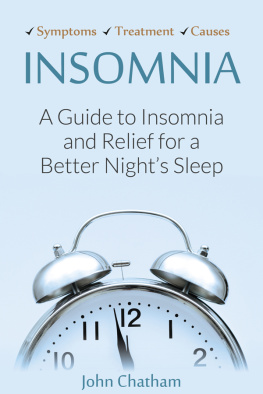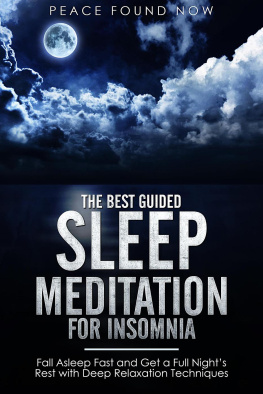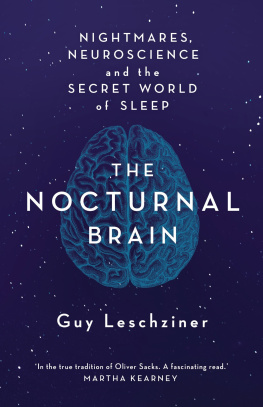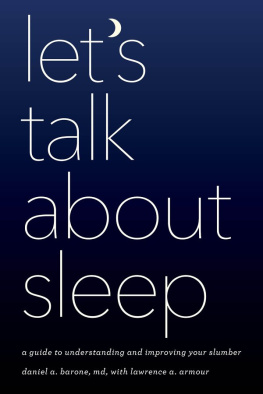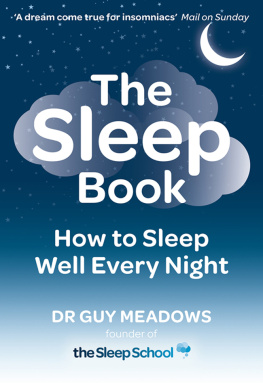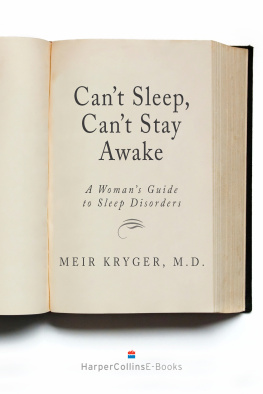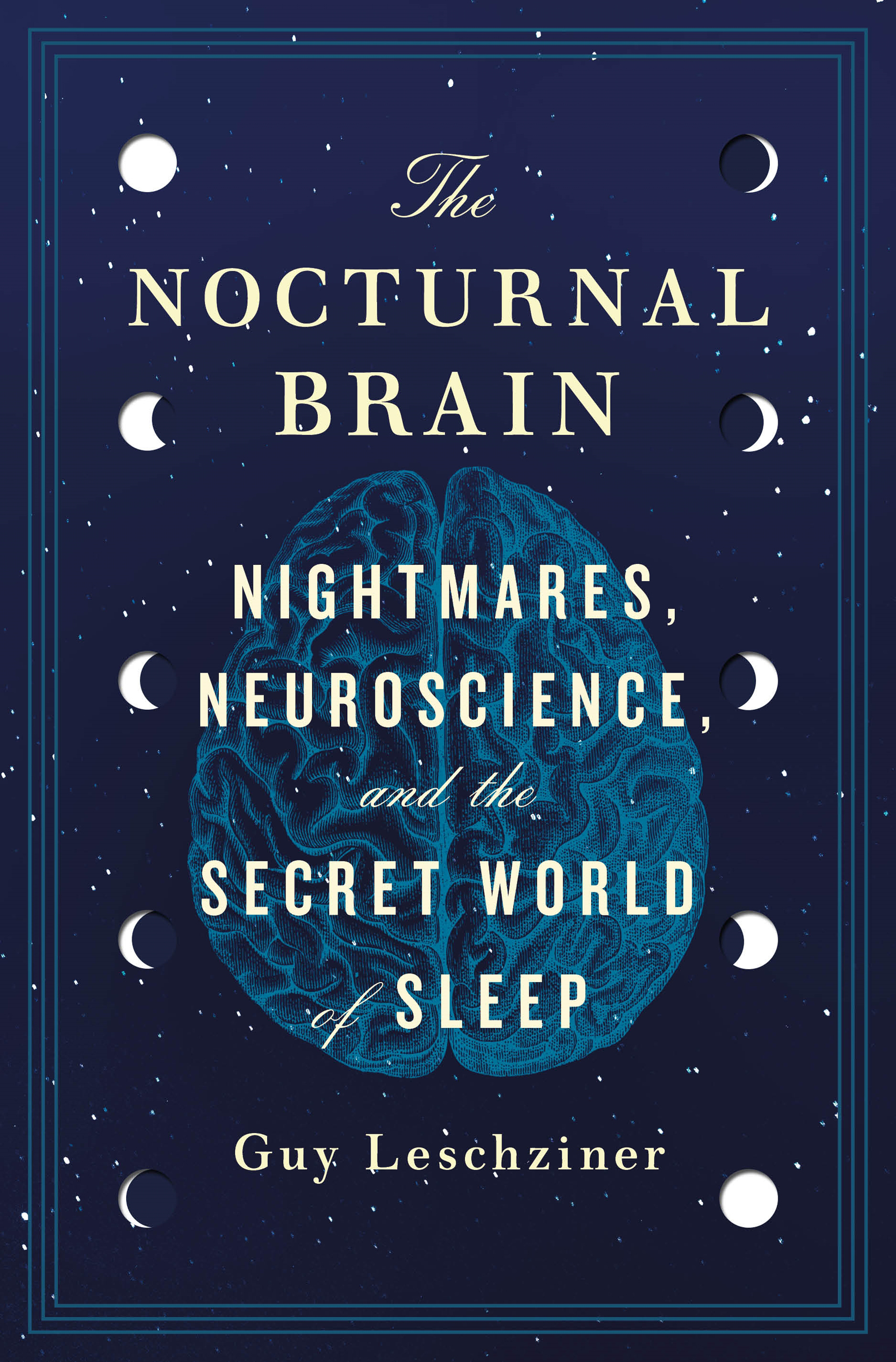The author and publisher have provided this e-book to you for your personal use only. You may not make this e-book publicly available in any way. Copyright infringement is against the law. If you believe the copy of this e-book you are reading infringes on the authors copyright, please notify the publisher at: us.macmillanusa.com/piracy.
We think of sleep as a tranquil act, when our minds are stilled and our brains are quiet. The act of sleeping is a passive one, and is associated with a blissful unconsciousness and the delight of waking refreshed. The only awareness we might have of something happening in the night are the fragments of a dream. That is, at least, for most of us. But for many of the patients in my sleep clinic, their nights are anything but this. Rather, a night in the sleep laboratory, where I admit my patients to study their nocturnal behaviour, is punctuated by shouts, jerks, snores, twitches or even more dramatic goings-on, and the torture of poor or even no sleep at all.
The normal expectation of waking up feeling ready for the day ahead is rarely found among my patients, or indeed their partners. Their nights are tormented by a range of conditions, such as terrifying nocturnal hallucinations, sleep paralysis, acting out their dreams or debilitating insomnia. The array of activities in sleep reflects the spectrum of human behaviour in our waking lives. Sometimes these medical problems have a biological explanation, at other times a psychological one, and the focus of the clinical work that I and my colleagues do is to unravel the causes for their sleep disorders and attempt to find a treatment or cure.
For the past few years, I have seen hundreds of patients per year with sleep disorders, causing insomnia, profound excessive daytime sleepiness or bizarre and frightening experiences at night. My path to this work has been accidental. In keeping with most doctors of my generation, my exposure to the world of sleep during my medical degree was pretty much non-existent. I cannot recall a single moment of teaching that focused on sleep until well into my clinical training as a neurologist, almost a decade after I graduated. It was only by chance, when I opted for an intercalated degree in neuroscience as a nineteen-year-old, that I was asked to write an essay on the function of sleep. As a naive but intellectually curious teenager, I had assumed, like most people, that the function of sleep was to stop you feeling sleepy, and that assumption was born out of personal experience. I went to bed when sleepy, and when I woke up, that sleepiness had left me.
However, in preparation for that essay, I came across a paper co-authored by Francis Crick, one of the discoverers of the structure of DNA. Crick had in later life become increasingly fascinated by consciousness and neuroscience, in part driven by a sabbatical at the Salk Institute in San Diego, a world-leading centre in neuroscience research. In that paper, Crick and his colleague speculated as to the function of dreaming, which at that time was thought to exclusively happen during a stage of sleep known as rapid eye movement (REM) sleep. They argued that the function of dreaming, rather than representing a Freudian royal road to the unconscious, was a form of housekeeping for the brain. Dreaming, they postulated, acts to prune out connections between cells in the brain that have developed during the day, and constitutes a type of reverse learning to get rid of useless information. The validity of this hypothesis remains controversial, but reading this paper was a light-bulb moment for an ignorant but interested medical student. The realisation that sleep not only had a purpose other than making you feel less sleepy, but was also a complex set of brain states, not simply a state of unconsciousness between going to bed and waking up, had a profound effect. It sparked my interest in sleep and its disorders, and has led me into this fascinating and often bizarre clinical realm of sleep medicine.
In this twilight world, glitches in the human brain result in striking and poorly understood conditions. All the more so as, in contrast to chest pain, headaches, skin rashes and more usual medical symptoms, these problems most often arise without any awareness, at a time when peoples brains and minds are detached from their internal and external world.
In the pages that follow, I will introduce you to some of my patients who have been willing to share their stories. The tales of these individuals are dramatic, terrifying, illuminating, poignant and sometimes amusing. You will see how their disorders affect the lives of those around them, their relationships with partners and children, as well as their own.
So why is it that Im writing about these patients? And, more importantly, why should you read about them? Many of the stories that follow are about patients with extreme sleep disorders, at the very limits of the spectrum of human experience, and it is by studying these extremes that we can learn about the less severe end of the spectrum; by understanding how these patients are affected by their sleep disorders, we come to know a little about how we ourselves are affected by our sleep. Many of these conditions are not rare, either: chronic insomnia affects one in ten adults; sleep apnoea about one in fifteen; and restless legs syndrome (RLS) about one in twenty. It is almost certain that anyone reading this book will either suffer from one or more of these disorders themselves or know someone close to them who does.
Doctors love stories; we love telling them and we love hearing them. We teach, learn and entertain each other with stories. In medical parlance, what a patient tells you in their own words is the history, the story, of their problem. As medical students and junior doctors, we acquire the skills to extract this history. Our medical journals and conferences are full of case histories, and it is precisely through the sharing of these stories that we circulate expertise and further our knowledge base.
I am a neurologist first and foremost, and the skills that I have learned through my neurological training are equally applicable in the practice of sleep medicine. As registrars (the equivalent of senior residents in the US) at the National Hospital for Neurology, Queen Square, in central London, we were exposed to a rite of passage: the venerated Gowers Round on a Thursday afternoon. Largely for teaching purposes, but also to provide some entertainment, this session takes place in a large lecture theatre with steep stalls. From the second row, where the neurology registrars sat, it felt a little like being in one of the amphitheatres of Rome and we were about to be fed to the lions. The craftiest registrars among us would find a patient that urgently needed assessment on the wards so that they could creep into the rear of the auditorium late, along with the hordes of junior doctors, medical students and visiting neurologists from abroad. The most devious would arrange for a colleague to page them early in the proceedings so they could make a show of leaving to deal with an emergency before sneaking in at the back of the lecture theatre later on.
The audience would await the sporting event with gleeful anticipation, while the registrars could only hope to survive the ordeal with a shred of dignity left intact. I have heard stories of colleagues vomiting in nervousness every Thursday lunchtime, others taking a beta-blocker pill to calm their anxiety prior to entering. For a painful ninety minutes, three cases would be presented. Usually the patients would be wheeled in at the front and the consultant chairing Gowers that day would grill the registrars on the cases, often exposing gaping holes in our knowledge under the glare of the 200 people sitting behind us.


